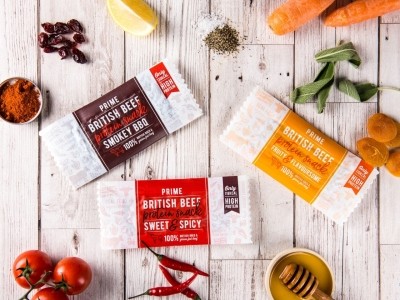Is keto tipping to the mainstream? ‘I cannot remember an underground buzz like the one ketogenic is sowing’

The global keto diet market is expected to grow from US$10.3bn in 2018 to US$17.8bn by 2026 at a CAGR of 7.1%, according to forecasts from Fior Markets.
Ian Hills of Purple Pilchard, a marketing agency that specialises in working with break-out food and beverage brands, believes that few trends have resonated as much or generated as much excitement as keto does today.
“Having worked in food and drink since the early 90's across a number of vibrant 'food minority' movements - gluten free, organic, vegan, dairy-free, raw/HPP - I cannot remember an underground buzz like the one ketogenic is currently sowing. Clearly detractors will murmur 'Atkins diet' under their breath, however, the world's moved on and a fresh perspective to low fat/calorie-controlled thinking is long overdue,” he suggested.
According to proponents, keto comes in answer to mounting consumer interest in clean eating as well as growing awareness of the relationship between diet, health and wellness.
The ketogenic diet is high-fat, moderate-protein and low-carbohydrate. Ketogenic diets make the body produce ketones, which are used as an alternative fuel when blood sugar levels are low. Ketones are produced in the liver from fat, making ketogenic a popular approach to weight loss.
“Health is the biggest trend [supporting keto] whether it be overall holistic health or for the sole purpose of weight or fat loss. Second to health is the trend to choose real whole foods, based on what our ancestors would have eaten, minimally processed and as natural as possible,” said Suzie Walker who co-founded The Primal Pantry, which was acquired by Nurture Brands, and more recently co-founded The Keto Collective.
Walker told FoodNavigator that she has seen a significant shift in attitudes towards keto diets, in particular over the past two years as people have come to reappraise the role that fats can play. “As a qualified nutritionist I was using the keto diet with my clients back in 2010. The keto diet was unheard at the time, with many people thinking the key to healthy eating was a low fat, calorie-controlled diet. Back in 2010 I would never have envisioned it coming into the mainstream, especially with our fear of fat along with the move to a more plant-based approach.”
But all that has changed: “Over the last two years keto has seen quite a surge, partly due to the rise in reducing carbs and sugar and at the same time being endorsed by celebrities and chefs. So to me keto is not a new thing, it is just not a secret anymore. We are more acceptable to the fat is good, sugar is bad mantra. We are more informed when it comes to our food choices and the world wide web is a plethora of information on all things keto. So keto is more accessible now than it ever was and keto friendly products are popping on both our online and offline shelves.”

Beyond weight loss: ‘Biohacking’ and food as medicine
When quizzed on the benefits of keto, Edward Taylor, managing director at Purition, told us that ‘only a someone who has never tried keto or never been overweight would ask this question’. “The benefits for health and weight management are startling. Keto diet can put a type 2 diabetes into remission within a week or two, but you'll need the support of your GP or health professional to manage the reduction of your medication.”
As Taylor inferred, for many ketogenic proponents the advantages go well beyond weight control.
Boostball, which launched a line of high protein snacks in 2016 that is now available in 19 different countries, rolled out its first keto range this year. Marketing manager Tammy Bonning believes that the health benefits of a keto diet mean this line – which is made with raw, cold pressed vegan ingredients – is a great fit for the Boostball brand.
“We see the driving force at the forefront of the keto diet is the importance of biohacking: the health benefits to increase energy levels, improvement in focus & concentration, improvement in sleep, increase in metabolism & reduction of low blood sugar levels and dips.”
Nick Bildner, founder and director of high protein snack maker Pulsin, agrees that the health benefits of keto could unlock a ‘medical revolution’ in how we approach chronic disease.
“The notion of staying healthy by reducing carbohydrates is fast becoming the new orthodoxy. It also has the potential to create a medical revolution in the way we treat chronic disease. As more people experiment with a healthy keto diet, and see positive results, they will take control over their own health. We also see keto and vegan co-existing as people increasingly opt for plant based, low carb foods,” he told this publication.
Increasing accessibility and availability
Keto could be about to become the next breakout category, as interest is boosted by a virtuous cycle of increased availability and accessibility.
In the UK, some of the more pioneering health-focused retailers have already established specialised keto areas in store and online – in a similar approach to that which saw gluten-free and plant-based categories break into the retail mainstream.
“We are already seeing this done successfully by retailers such as Planet Organic who have an excellent keto section in store and online. Both Superdrug and Boots have also trialled weight management sections with keto playing a large part. I believe more retailers will create keto sub-categories because consumers will drive this change as the diet becomes more popular,” Bildner predicted.
Looking to the future of the keto market, Amy Moring of Hunter & Gather pointed to the development seen in more advanced markets for keto. “When we visited Australia and New Zealand in 2019 we were surprised and delighted to see keto designated areas in their major supermarkets. We are also seeing retailers adding "keto friendly" as an option on their new product forms, which was never considered when we first launched in 2017.”
Like Bildner, she believes consumers are in the driving-seat when it comes to increased uptake of keto. “Consumers are driving the needs, brands like us are providing the products and retailers are starting to listen.”
Boostball’s Bonning added that online is an important sales channel for keto brands, with a rising number of keto specialist e-shops in the UK and other European markets. “The online presence of keto shops is rising such as Keto Supply. Germany is another area we have noticed a surge in e-commerce and retail keto supply, Simply Keto is a strong prime example.”
Innovation opportunity… and risk
For many pioneering brands in the keto space, innovation is boosting consumer excitement and expanding the boundaries of what was once a highly niche diet.
No Guilt Bakes is one such innovator that has moved keto into an area that wouldn’t be thought of as a natural space for a low-carb, low sugar diet to play: baked treats.
Co-founder Taeya Abdel-Majeed believes that innovation and NPD is vital to grow the category. “We want to keep pushing the boundaries, so far we have been replicating standard cakes etc but we continue to product development as we grow and are really excited by the next line up of treats as we grow our customer base.”
She added that there are plenty of innovation white-spaces in the keto arena. “There are still so many carb choices that don’t have equivalents in the low carb arena so I think there is tonnes of opportunity. We’d love more brands to collaborate with,” Abdel-Majeed elaborated.
However, others strike a more cautious tone about the segments and product formats that keto should drive into. Purition’s Taylor noted: “The last thing keto needs is mass innovation. Innovation invariably means refined ingredients and hyper palatability. Gluten free used to mean not eating wheat, innovation replaced the wheat but processed gluten-free products are not healthy. I hope this does not happen to keto but sadly it's happened in the USA with many product being labelled as keto that are not compatible with a keto diet or are compatible but are highly refined.”
Abdel-Majeed agrees that it is important that any keto innovation remains true to the core principles of the diet. "It's more than just filling products with all kinds of artificial ingredients – natural products matter too so we will continue to promote that.”
Hunter & Gather’s Morning also stressed the need to maintain the integrity and reputation of products marketed as keto friendly. “The term 'keto' is loosely regulated in the UK and there is a concern of products utilising the marketing term 'keto' when the products aren't something that will truly support a healthy lifestyle alongside ketosis.”





























